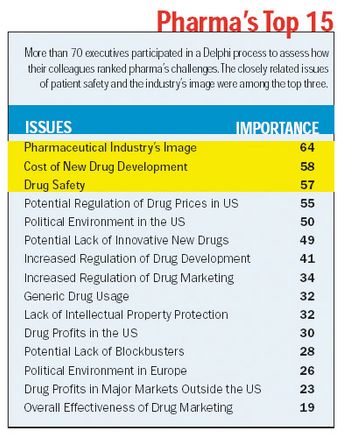
Novartis' upcoming anti-hypertension combo and campaign target noncompliance.

Consumers say no, and they're watching which companies are naughty or nice.

PEE Advertiser Study - Clinical

PEE Advertiser Research Study

Biotech companies, for years at the mercy of their deep-pocketed pharma partners, are finally holding the strings.

Cardio competitors team up to find new ways of preventing heart attacks.

(And the Times' front-page pounding had nothing to do with it.)

Multi-company campaign hopes to cast clinical trial participants as 'heroes.'

Government report paints picture of ineffectual FDA buried by avalanche of ads.

SUPPLEMENTS

Pharma faces a wide array of pressing issues-almost too many to think about comfortably-from drug safety and the industry's image to intellectual property in emerging markets and the overall usefulness of marketing. To remain effectively focused on strategy, industry executives must find relations between all the individual issues and group them into larger themes. Pragmatically, we all know this is essential.

Pharma's next big challenge is simple: Rebuild its broken business model. But between expiring patents and dry pipelines, pricing wars and safety woes, a beleaguered FDA, a bloodthirsty OIG, and Dems on parade, many companies are just trying to steer clear of icebergs.

Analysts say Times' accusatory articles on Zyprexa are nothing to get excited about.

FDA's revisions to guidelines on expanding access to experimental drugs intensify an already murky issue for pharma.

At its annual pipeline debut, the company introduced its own CETP-inhibitor--with doubts.

Studies show pharma has succeeded at raising disease awareness. Brand loyalty, though, has suffered.

Recent drug trials, and marketing efforts in Europe, for Acomplia indicate that Sanofi-Aventis may be seeking a life-threatening indication for its much-hyped weight-loss drug.

Pfizer, Novartis--and even Merck--are putting the past behind them, and moving forward with COX-2 innovation.

Possible sale of medical nutrition unit would not mark change in business model for the diversified drug maker.

Pfizer's torcetrapib blow shifts cost-cutting measures into overdrive, causing all of industry to reevaluate staffing, marketing spend, and the viability of a potential cardiovascular breakthrough.

Shire markets ADHD patch with unbranded campaign.

In a pitch of holding company vs. separate agencies, IPG nabs top prescription brands from WPP.

Merck branded spots for HPV vaccine use strategic messaging.

BMS is the first on what's bound to be a long list of opponents in the recent ruling on the definition of "average wholesale price."

Genentech says Tanox acquisition does not signal a shift in strategy.

Industry points to new reports on Part D to blunt new Congressional critics.

Advertise in the PharmExec Direct Marketing Edition

Advertise in PharmExec Direct

Need to know the latest on new campaigns, agency-client relationships, and personnel changes? Sign up now to receive the latest drug marketing news, including account wins, case studies, and trends on alternate Wednesdays.
